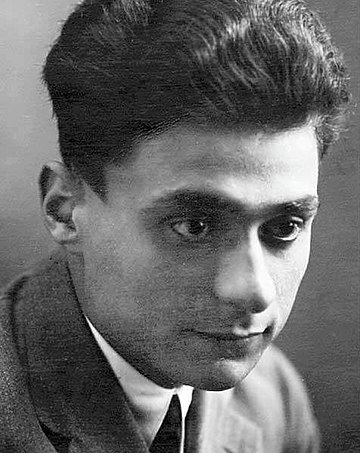Elias Venezis (Greek: Ηλίας Βενέζης) (March 4, 1904 - August 3, 1973) is the pseudonym of Elias Mellos (Ηλίας Μέλλος), a major Greek novelist. He was born in 1904 in Ayvalık (Kydonies) in Asia Minor and died in Athens in 1973. He wrote many books, of which the most famous are Number 31328 and Aeolian Earth. He is considered to be one of the writers of "Generation of the '30s".[1][2]
You can help expand this article with text translated from the corresponding article in Greek. (July 2018) Click [show] for important translation instructions.
|
Elias Venezis | |
|---|---|
 Elias Venezis in 1925 | |
| Born | Elias Mellos 4 March 1904 Ayvalık (Kydonies), Ottoman Empire |
| Died | 3 August 1973 (aged 69) Athens, Greece |
| Occupation | Novelist |
| Nationality | Greek |
Biography
Elias Venezis was born and raised in Aivali (the hellenized pronunciation of Ayvalık), where he completed high school. During the World War I, Venezis’ family fled from Aivali to Lesbos to avoid persecution but returned to Asia Minor after the Greek army took over Smyrna and its hinterland in 1919. When the area was recaptured by the Turkish Army, Venezis was taken prisoner and enslaved in a “labour battalion”. He was 18 years old. The prisoners were marched into the interior, but few arrived at the destination, since most of them were either killed on the way, or died of the hardships they were exposed to. Of the 3000 "conscripted" into his “labour brigade” only 23 survived.[citation needed]
When Venezis was released he was returned to Lesbos. There he met Stratis Myrivilis, who had founded the weekly newspaper Kambana, and was encouraged by him to write an account of "his horrific experiences as a hostage in Turkey" for the newspaper.[3] The novel which resulted was published in serialised form in Kambana in 1924. However it did not become well known in Greece until an expanded version was published in book form in 1931.[4]
His major novels are about his life in Asia Minor: Aeolian Land describes the lost Eden of his childhood summers; Number 31328 the horrific experience of the death marches, and Tranquility his struggle to adjust to living in Greece.
In Greece, Venezis worked for a bank while writing in his spare time. He married Stavritsa Molyviati in 1938. She too was from Aivali.
During the German occupation of Greece, Venezis was taken prisoner again. He was released following the intercession of high-ranking Greek officials including Archbishop Damaskinos.
After the war, Venezis wrote a column in the newspaper Acropolis. He was made a member of the Academy of Athens.
Books by Elias Venezis
- Number 31328 (Το Νούμερο 31328, 1924; 1931)
- Manolis Lekas and Other Stories (1928)
- Tranquility (Γαλήνη, 1939)
- Aeolian Earth (Αιολική Γη, 1943)
- Block C (play, 1945)
- Exodus (Έξοδος, 1950)
Books in English
- Elias Venezis by Alexander & Helen Karanikas (New York: Twayne Publishers, 1969)
- Block C by Elias Venezis (Athens: I.D. Kollarou, 1946)
- Aeolia by Elias Venezis, trans. E. D. Scott-Kilvert (London: William Campion, 1949; New York: Vanguard Press, 1957)[5]
- Aiolian Land by Elias Venezis (Montréal: McGill University, 1979) in the series The McGill University Companions to Modern Greek Studies
- Land of Aeolia by Ilias Venezis - Therese Sellers (Translator) - Denise Harvey 2021
References
Wikiwand in your browser!
Seamless Wikipedia browsing. On steroids.
Every time you click a link to Wikipedia, Wiktionary or Wikiquote in your browser's search results, it will show the modern Wikiwand interface.
Wikiwand extension is a five stars, simple, with minimum permission required to keep your browsing private, safe and transparent.
